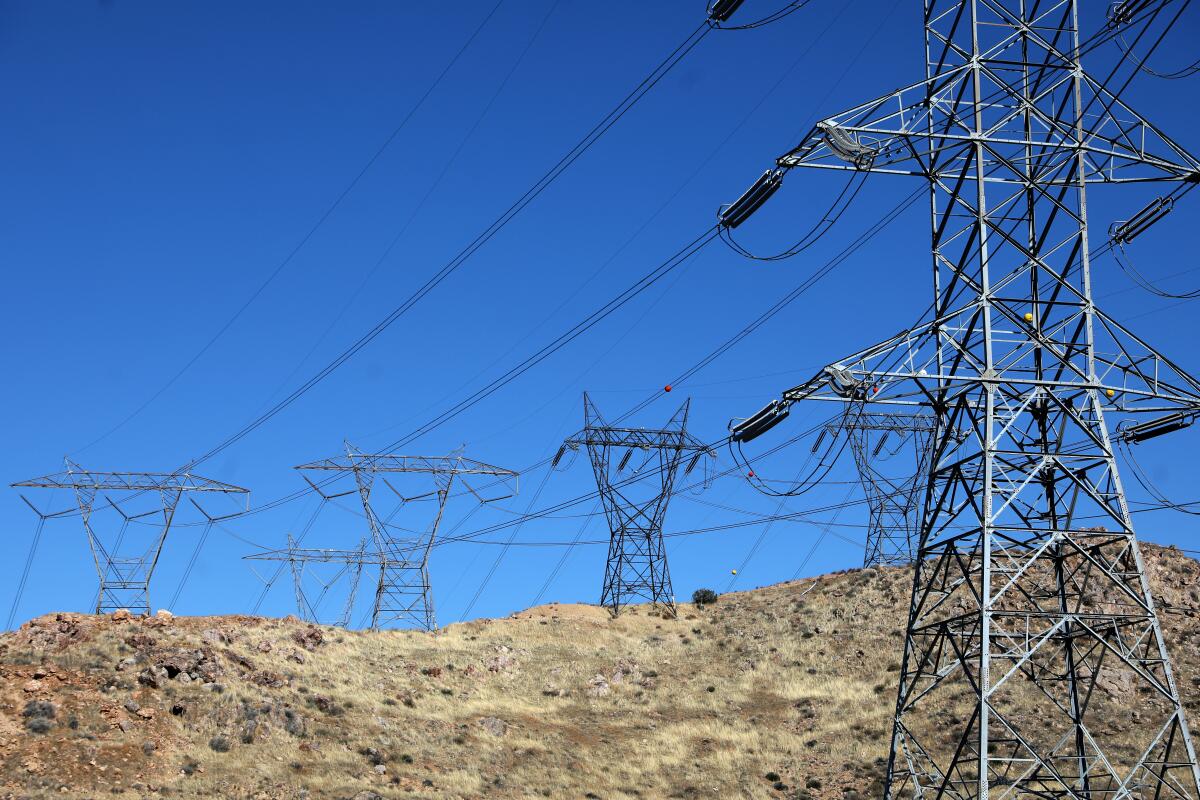California utilities to spend $13 billion to reduce wildfire risk

- Share via
SAN FRANCISCO — California’s largest utilities said Friday that they will spend about $13 billion to reduce the risk of wildfires following the worst fire season in modern state history and a string of blazes that were blamed on their equipment.
Pacific Gas & Electric, Southern California Edison, San Diego Gas & Electric and some smaller utilities filed state-required annual wildfire mitigation plans with California’s Public Utilities Commission, which must approve them.
PG&E, the nation’s largest utility with more than 5.5 million customers concentrated in the north and center of the state, proposed a plan covering 2021 and 2022.
It includes a new computerized risk model that will help it pinpoint the areas most prone to wildfires where the utility will concentrate safety work, PG&E said.
The utility said it will continue efforts to expand those measures, which include installing poles that are more fire-resistant and moving overhead power lines underground to keep them from sparking fires if high winds knock them down or blow tree branches into them.
The utility also said it will continue installing weather stations and high-definition cameras throughout its coverage area of 70,000 square miles.
PG&E said it also will continue efforts to reduce the size of deliberate power shutoffs that have blacked out hundreds of thousands of homes and businesses for several days during windy weather. That would include installing hundreds of devices to limit power outages, along with microgrids, which use generators to keep the electricity on and providing more crews to make repairs and restore power.
The latest plan follows a year that saw a record 4 million acres burn around the state, and the risk continues to grow, PG&E said.
“We are planning around and operating under that assumption,” said Matthew Pender, PG&E’s director of community wildfire safety. “We anticipate fire seasons to continue to be very extreme.”
PG&E’s outdated equipment was blamed for causing a series of wildfires during 2017 and 2018 that killed more than 120 people and destroyed more than 27,000 homes and other buildings. The damage caused PG&E to file for bankruptcy in 2019, opening a legal avenue for the company to negotiate $25.5 billion in settlements with wildfire victims and others.
In addition, SPG&E last year estimated that it could face nearly $1 billion in claims from two fires in 2019 and 2020 that killed four people and destroyed hundreds of homes. Authorities blamed PG&E equipment for the 2019 blaze, and the utility is under criminal investigation in connection with last year’s conflagration.
The utility has emerged from bankruptcy and received permission to pass on some costs of its wildfire mitigation efforts to ratepayers. The utility estimated the cost of the plan over 2021 and 2022 will run about $6 billion.
Southern California Edison and San Diego Gas & Electric also submitted updated mitigation plans at a total estimated cost of nearly $5 billion for 2021 and 2022.
Last month, Southern California Edison announced it would pay $2.2 billion to settle insurance claims from a 2018 wildfire sparked by its equipment. Edison, which acknowledged no wrongdoing, said the agreement covers all claims in pending lawsuits from insurance companies related to the Woolsey fire in Los Angeles and Ventura counties. Three people died and more than 1,600 homes and other buildings were destroyed.
More to Read
Sign up for Essential California
The most important California stories and recommendations in your inbox every morning.
You may occasionally receive promotional content from the Los Angeles Times.










